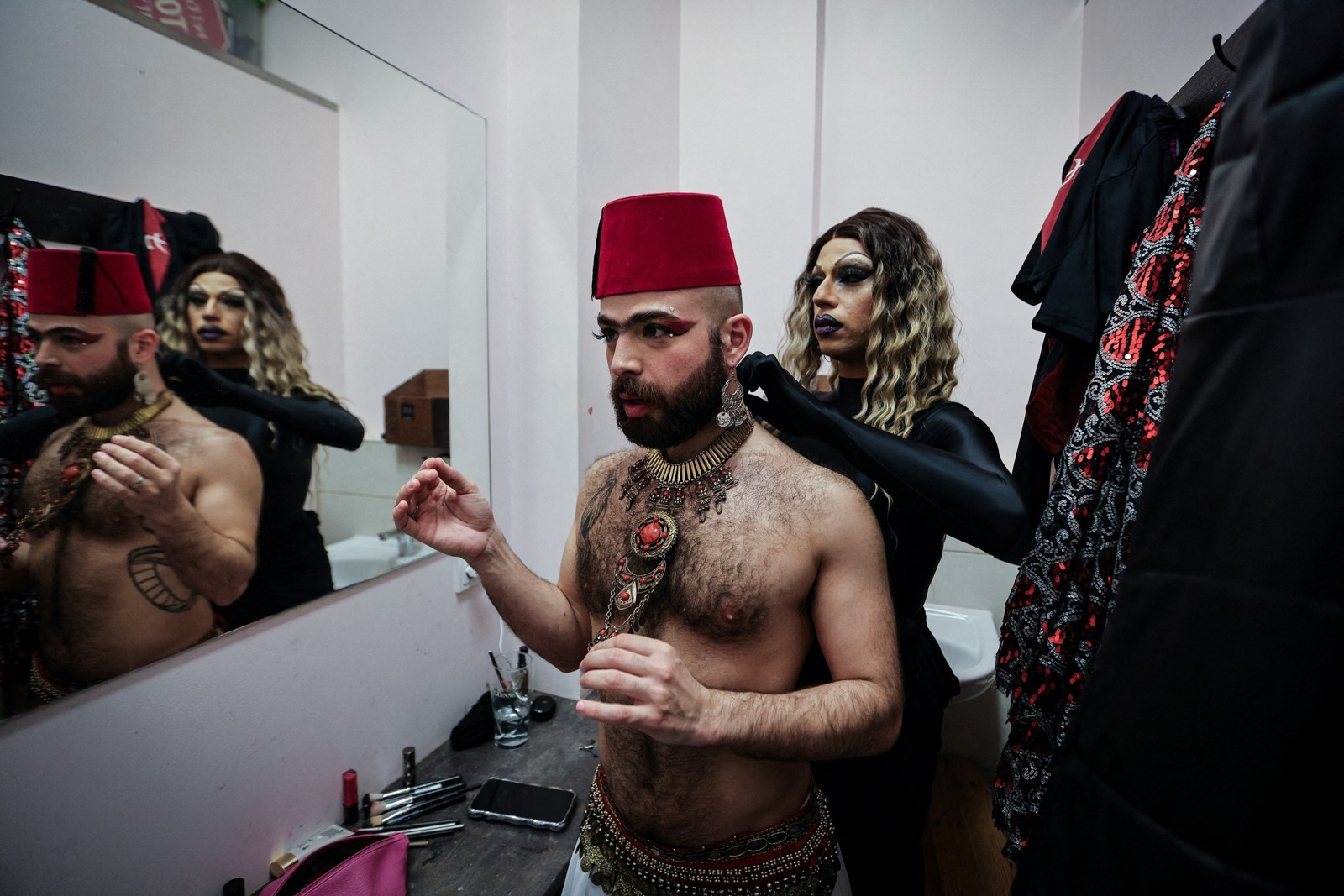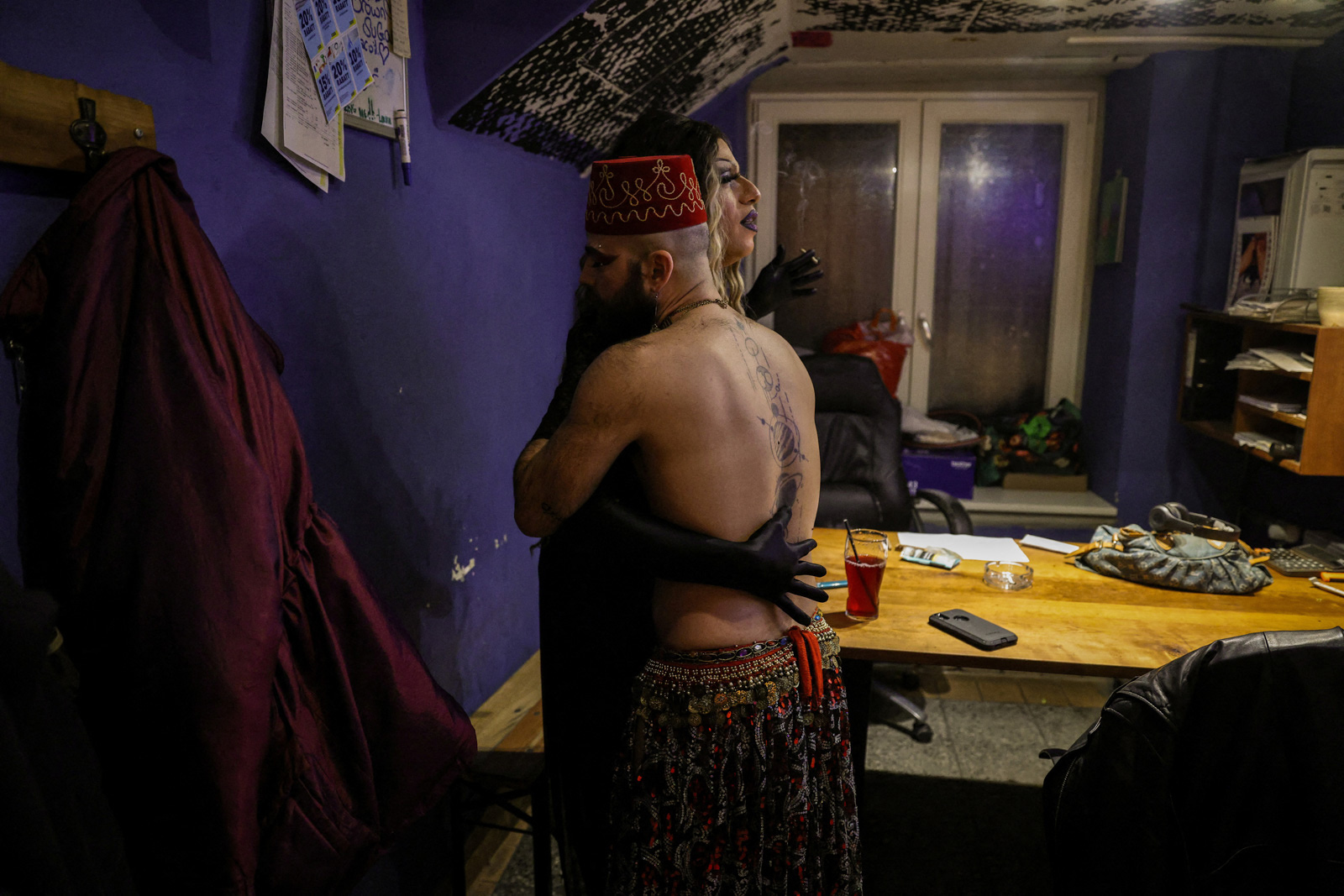Cabaret act highlights the potential for Arab-Jewish harmony
A queer, non-binary Syrian performer is promoting unity and dialogue from Germany’s drag clubs
–

Early one April evening in Berlin’s Tipsy Bear bar, a legendary drag venue in the eastern neighbourhood of Prenzlauer Berg, the Darvish performs their trademark routine. As they spin their hips in the classic style of Arabian belly dancers, an animation of Sufi whirling dervishes plays on the wall behind them. The crowd, a mix of regulars and curious drop-ins, whoops and cheers enthusiastically.
A queer and non-binary Syrian performer, the Darvish has been co-hosting cabaret parties alongside Israeli drag queen Judy LaDivina since 2017, but this evening’s performance is a little different from the events the pair have organised in the past. At the interval, attendees are encouraged to anonymously write down any questions they have about the Israel-Gaza war, or just any thoughts and feelings they want to share. The Darvish and Judy then take a break from singing and dancing to read them out.
“I have many Arab and also many Israeli friends, but I feel caught in the middle and don’t feel comfortable talking to any of them about the conflict,” the Darvish reads.
“Maybe this is the time to try bringing them all together,” Judy suggests.
The Darvish has become a fixture in Germany’s LGBTQI+ party scene over the past few years, bringing a unique gender-bending Arabic flair to stages around the country. Their act is overtly Middle Eastern, combining Islamic imagery and traditional Arab dance. The party they run with Judy — who has both Arab Jewish and Palestinian heritage — was originally called Yalla Hafla, meaning Let’s Party in Arabic, and created as both a celebration and a unification of their shared cultures.
After 7 October, this tone no longer felt appropriate. “We could no longer get up on stage and be as joyful as before,” the Darvish said over Zoom a week after their April performance. The pair changed the atmosphere of the show to make it more contemplative and reflective, renaming it Together. They wanted to create a space to have difficult but necessary conversations — exactly the type their audience member had told them they were finding hard to start. “If we don’t talk to each other, then this cycle of destruction is just going to continue,” the Darvish said.

The Darvish grew up in Latakia, a large port city in Syria, and came to Germany on a student visa in 2016. Although they never trained professionally, dance and music were a coping mechanism for them through their childhood and teenage years, when they were often bullied at school because of their sexual identity. “I would come home, close the door to my room, put on my mum’s high heels, crank the music up high, start dancing and forget about everything that had happened that day,” the Darvish said.
After moving to Germany, they were dancing in a club with some friends when Judy spotted them. “I think I was just dancing hip-hop but putting in some hip movement, and giving it some Arabic flair,” they said. Impressed, Judy invited them to perform at a show she was hosting.
The pair clicked creatively, and decided to develop a new show together that united their cultures and represented the potential for Arab-Jewish harmony. “At first we were very afraid of how it would be perceived, so we called it Mediterranean Passion,” the Darvish said. After seeing the positive reactions from audiences, the pair decided to fully lean into their Arab-Hebrew roots and rebranded as Yalla Hafla.
The Darvish grew up in an Alawite community and does not consider themselves particularly religious but has been inspired by the traditions of Sufism, a body of Islam that focuses on the individual’s personal connection with God. Devotees known as dervishes perform a dance meditation known as whirling. “[Growing up] I would watch all the ceremonies on TV and during holidays,” they said. “That concept is so beautiful — you dance with the goal of getting into a trance state to connect to a higher power.” They combined this with the dance moves of the Arabic pop stars they used to imitate in their bedroom all those years ago.
Initially, the show received a backlash — “mostly the stereotypical idea that a Syrian is working with the enemy” — but it soon grew a devoted following among the Arab and Israeli queer communities. Inevitably, 7 October put a stop to the celebration. “We were devastated,” the Darvish said. “We were suffering, and I think we are still suffering.” After a few months’ hiatus, the pair realised they didn’t want to cancel the show altogether, but instead wanted to create a space to have conversations — something they both felt was missing from Germany’s cultural scene after a raft of pro-Palestinian artists were censored by venues and politicians.
Together launched in March and coverage of the first show quickly went viral on social media. The Darvish said they experienced some trolling and backlash, but overall received “lots of positive, wonderful comments. I’m glad that many people see it’s possible to have a narrative that’s not just one side or the other,” they said. “Because, let’s face it, this conflict has gone on for so many years, we need to stop going back to the past and look at how it could be in the future.”
Topics
Get the Hyphen weekly
Subscribe to Hyphen’s weekly round-up for insightful reportage, commentary and the latest arts and lifestyle coverage, from across the UK and Europe
